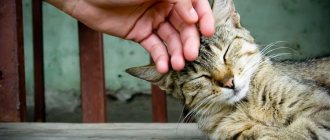An aggressive and uncontrollable cat is a big problem for all family members. For adults this is an inconvenience, for children it is a serious danger. You should not turn a blind eye to the aggressive behavior of an animal, since weaning a cat from biting is an important step in raising an obedient and affectionate pet.
Why does a kitten bite and scratch?
Normally, the animal should be friendly towards humans, because cats were domesticated many hundreds of years ago, and trust in people is enshrined at the genetic level.
But there are times when behavior “failures” occur, and it is very important to correctly and timely detect their cause. There are also a number of cat breeds that are characterized by caution towards people, reluctance to close contact, isolation and pronounced hunting instincts. When choosing a pet, you must take this into account. Plus, for such cats, the correct attitude of the owner is of great importance, since it is much more difficult to wean an adult cat from biting and scratching than a kitten. Once such behavior has become normal, it will be difficult to eradicate it.
The reasons why kittens start biting and scratching can be divided into several groups:
- play aggression;
- illness and poor health;
- educational problems and psychological difficulties.
Gambling passion
Domestic cats are deprived of the need and opportunity to hunt. A person takes care of a pet, providing it with food and comfortable housing. Thus, natural instincts are suppressed, which cannot but affect the behavior of the animal. As a result, play becomes the kitten's form of self-expression. The invincible desire to be a hunter prompts him to hide in a corner, watching the movement of a potential victim, and then suddenly pounce on him.
In nature, the result of hunting is the killing of prey. Domestic cats are addicted to the game itself. Having caught a toy mouse, they bite, twirl, and spank it with their paws for a long time, prolonging the pleasure. Such fun is vital for both a kitten and an adult cat. A person should not stop an animal’s play activity; at the same time, it must be within certain limits.
Excessive enthusiasm for play is the most common reason why a kitten bites and claws; you can wean him off this with proper upbringing.
An example is the cheetah and its way of hunting in the wild. He attacks a victim that is significantly larger than him in mass. The predator grabs the animal’s scruff with its teeth, clasping it with its front paws, while delivering strong blows with its hind paws. This is how small domestic kittens very often play with the hands of their owners. At first this is funny, but later, when the cat grows up, the blows and bites will no longer be so harmless.
The same can be said about attacking a person's legs. The kitten rushes at the walking owner, striking with its front paw. This is one of the ways to kill an animal in the wild. Although jumping and biting the legs can also indicate a lack of attention and a desire to play. It happens that gaming aggression is not associated with excessive enthusiasm, but, on the contrary, with the desire to play and boredom.
Kitten feeling unwell
A kitten may bite and scratch if it is feeling unwell. The most common ailments:
- teething - a fairly short period for kittens, the problem is solved by purchasing special toys or treats that can be nibbled and chewed for a long time;
- fatigue - the kitten does not want to be disturbed or stroked, and lets the owner know this by slightly biting or scratching him;
- hormonal changes - for example, during pregnancy and breastfeeding;
- disease - a kitten, not knowing other ways to signal a person, begins to bite and scratch. In this case, you need to pay attention to the presence of other signs of the disease - loss of appetite, pain when touched, urination problems.
If the reason for the aggression lies in the kitten’s well-being, then you won’t need to wean him off biting and scratching - you just need to take your pet to a veterinarian, who will examine him and prescribe treatment.
Some cats simply don't like certain touches, such as in the belly area. This is a vulnerable spot for cats, damage to which can lead to death - the understanding of danger is fixed at the level of instincts, so aggression in response to stroking the belly is a normal reflex reaction. Stroke the animal so that not only you enjoy it, do not do anything that is unpleasant for the kitten, and do not be overly intrusive. Perhaps later, when the cat begins to trust you more, he himself will offer his tummy for stroking - this is a sign that the animal considers you a close friend and is not afraid.
Behavioral reasons
The most extensive and complex group of reasons is associated with behavioral characteristics. Cats are mysterious and capricious creatures. Each of them has its own character, on the basis of which a behavior model is formed. This is the difficulty of education - there are no universal recipes for how to wean kittens from biting and scratching from childhood. Rather, we can talk about general recommendations and what should not be allowed.
Aggressive behavior can be caused by various reasons.
- Fright and stress - sensing danger, the kitten may hiss, fluff its tail and, most likely, run away and hide. But if there is no escape route, then the animal may attack. Something specific can scare a kitten, such as a sharp sound, smell, or behavior of another pet. But aggression is sometimes part of adaptation. Many kittens experience moving and a new environment painfully. In this case, you just need to leave the pet alone, giving it time to get used to it and understand that the new place is not dangerous.
- Competition - the kitten aggressively perceives other animals at home or on the street. This applies to both male and female cats. The fight for territory is one of the strongest instincts of cats. If the cause of concern is the neighbor's cats, which the animal simply sees through the window, then close the curtains for a while. Unable to drive away competitors, the kitten can attack nearby people. If the reason is another animal already living with you, then solving the problem is more difficult. Very often it is not possible to reconcile animals. A cage with a bird or rodent can be placed in a room where the kitten does not go. But if it is a dog or a cat, it will not be possible to isolate the pets from each other.
- Protecting the territory - the kitten considers part of your apartment to be his own. If you try to force him out of it, the response may be aggression. As a rule, this is also associated with errors in upbringing and encouragement of unacceptable behavior by the owners.
- Early weaning from the mother and young age of the kitten. The foundations for raising a baby are laid by a cat. She gradually weans the kittens off milk, forcing them to switch to solid food. Also, an adult cat strictly suppresses unacceptable behavior, including spanking and punishing children. When a kitten is taken away from its mother early, a person must take on educational functions. But he, as a rule, spoils the pet. As a result, it turns out that the kitten does not have a stopper in behavior, and it will be difficult to wean him from biting and scratching in the future.
- Character and heredity. It is known that aggressive behavior is inherited. Professional breeders specifically cull individuals with inappropriate behavior so that their genes are not passed on to future generations. But if you adopted a kitten from a barn cat, then be prepared for the fact that it will not be easy to tame it. He does not trust people, is not used to close contact with them and, accordingly, may react unfriendly to attempts to improve relationships.
- Wrong rewards and parenting mistakes are a very common reason why it is not possible to wean a kitten from biting and scratching. Initially, the owner chose the wrong model of behavior, encouraging aggression and not stopping the kitten’s unacceptable actions.
- Psychological characteristics and problems are the most difficult to resolve group of causes of aggressive behavior. These include dominance, a sense of vulnerability, the cult of the owner, revenge, lack of attention, night activity, breed specificity, lack of physical activity, and complexes.
Dominance involves competition with the owner or the perception of him as a weaker creature. When feeling vulnerable, the kitten decides to attack in order to avoid being attacked. Master cult means excessive attachment to one of the family members, in which the kitten attacks others. With a lack of attention and physical activity, the behavior of kittens is very similar to the actions of children in a similar situation. They mischief, tear the upholstery of the sofa and wallpaper in order to somehow have fun and attract attention to themselves. Night attacks on owners are associated with the hunter's instinct and, as a rule, can only be resolved by separate sleep between man and animal.
Aggression may be part of the breed's characteristics. The leader in the ranking of the most evil and vindictive cats is the Siamese. They say that she can attack and bite her owner for an insult caused a few days ago. Various hybrid breeds, which are a mixture of wild and domestic cats, are also aggressive. For example, Savannah with the genes of the African serval, Chausie - a mixture with the reed cat, Desert Lynx - a hybrid with the American red lynx, and many others.
The American Maine Coon, British Shorthair and Scottish Fold cats have a wayward character. Representatives of these breeds are sensitive to human behavior and are easily offended. But most owners still speak of them as very affectionate, intelligent, friendly and playful cats.
It is worth mentioning another reason why a kitten bites its owner. A bite can be a manifestation of not only aggression, but also love. In nature, animals look after each other in this way and show their affection. It is easy to distinguish such a bite from aggression: the kitten either slightly bites the hand, then licks it, then again alternates between biting and licking.
Features of cat psychology
We should not forget that cats, by their nature, are independent animals that need privacy. With frequent contact with a person, endless display of affection, and the inability to be alone with itself, a cat can become irritable, nervous and aggressive.
It is worth paying attention to such behavioral features as tension, pressing ears, wagging the tail, dissatisfied rumbling, hissing, dilated and enlarged pupils. In this case, it is better to leave the pet alone for a while and wait until it itself shows a desire to communicate with the owner.
Veterinarians explain the state of aggression by the fact that cats have an increased sensitivity threshold compared to humans and other pets. In addition, the animal may simply be in a state of nervous excitement, requiring temporary rest and solitude.
In some situations, a cat, and especially a male cat, can demonstrate its dominant behavior in this way, showing who is the leader. This kind of behavior should definitely be stopped in order to avoid more serious problems in the future.
How to deal with kitten aggression during play
Based on the above reasons, you can give advice on how to stop a kitten from biting and scratching during play.
- Let your kitten understand that scratching and biting a person's hands when playing is unacceptable. Offer him toys, scratching posts, balls in return. React strictly if the kitten bites and scratches, stop playing immediately so that he understands that he did wrong.
- Encourage your kitten to play with toys and reward him with treats. He must understand that the object of hunting can only be objects, and not the human body.
- If a kitten bites you, do not pull your hand away - this will only provoke it. Move your hand toward the mouth, not out of it. This will confuse the animal and break the hunter-prey plot. Accompany your actions with verbal reproach, so that by your tone he understands that you are unhappy and scolding him.
- Do not allow the animal to scratch furniture or a person, even as a joke, immediately stop any such attempts.
- Provide the kitten with the opportunity to sharpen its claws, equip a special place for this. Every time he tries to scratch the walls or furniture, take him to the scratching post with verbal instructions in a stern tone.
- If the kitten is carried away by the game and goes beyond what is permitted, divert his attention to some object that will interest him: a ball, a twig, a rope, a bow or any other toy.
- If the kitten clings tightly to your hand, relax it and stop moving. In the wild, this means the death of the prey, so the predator instinctively unclenches its jaws.
- Sometimes the solution may be to purchase a second kitten - two animals will have more fun, and you won’t have to seek human attention. At the same time, this can provoke competition between kittens, so it is better if you take two babies at the same time, so that they initially divide the territory among themselves and establish relationships.
- Remember that a kitten is not a toy; do not allow yourself or your children to torment it, grab it by the ears, paws, or pull its tail. The animal very sensitively understands the rules of behavior - if aggression is allowed to a person, then so is he. Plus, a defensive reaction, a sense of vulnerability, anger and other psychological factors are added to this.
- For very playful kittens, it is recommended to equip an entertainment corner where they can climb, jump, sharpen their claws, and play with hanging toys.
What can influence a pet's character?
Some physiological and psychological aspects can also affect the character of cats, changing their behavior and attitude towards the owner and his affection. Unexpected aggression, manifested for no apparent reason, can be provoked by:
- Puberty . At this time, young cats behave like teenagers - aggressively, demonstratively. This is explained by hormonal surges and the emergence of new physiological needs. The solution here would be to find a mate for the pet or castration.
- Declawing is a major stressor for your pet. Feeling vulnerable and defenseless, a cat may try to defend itself with its teeth, even without visible potential danger.
- Lack of attention and care . Lack of communication and poor living conditions do not have the best effect on the psychological state of a pet. Therefore, it is worth finding about 15-20 minutes every day to play with your pet.
- Changing baby teeth to molars is accompanied by itching and unpleasant sensations in the gum area in kittens, which they try to eliminate with bites. Providing your pet with special toys designed for these purposes will help solve the issue.
Only by finding out the reasons for the strange behavior of your furry pet can you find the right options for its correction.
How to correct mistakes in raising a kitten
In most cases, it is necessary to wean a kitten from biting and scratching due to mistakes in human behavior.
- Do not allow the animal to play with the person's hands and feet. Bites and scratches during play are entirely the owner's fault. To stop unacceptable behavior, you can shout loudly or clap your hands. Some owners of playful kittens advise to hiss - in this way the animals threaten each other, so such a signal is very clearly perceived by them.
- Be careful with punishments. A person should not show aggression towards an animal. It's okay to lightly tap your kitten on the nose, but don't cross the line between pointing out unacceptable behavior and causing pain. Do not hit the animal with your hands or feet; use a light newspaper or a thin twig. Don't lock your kitten in a confined space. The ideal punishment is a spray bottle of water. It does not cause harm or pain, but the animal remembers this unpleasant effect well. And remember that punishment must be immediate, within 2-3 seconds after the offense. Then the kitten will no longer understand why you are punishing him, and will simply perceive it as unfriendly behavior.
- A typical mistake is petting the owner before some unpleasant procedure, such as bathing or vaccination. Such luring creates a negative experience and distrust of the person. In the future, with any affection, the animal will expect something bad and react aggressively.
You can also give some general tips on how to stop a kitten from biting and scratching:
- take the kitten in your arms more often, pet it, if it is perceived positively by it;
- create a calm environment at home, try not to scream or quarrel with other family members - this way the animal will be calmer;
- do not try to break the character of the animal, but do not allow it to manipulate you, do not follow the lead when the kitten demands something by biting or in other inappropriate ways;
- Play with the kitten more often, giving him the opportunity to frolic. A good solution for this would be a laser pointer - any kitten loves to chase a bright moving dot.
Personal experience of pet owners
My stepfather has a young cat in Moscow... He and I became very good friends, but he bit and scratched very painfully. Roma (that’s my stepfather’s name) was shocked when I taught Chernysha (the cat’s name) to stop biting. For a long time he could not understand how I did it. It’s simple: using the banal “no”. Now Chernysh is following me on my heels. He plays with me most often. One time Roma was playing with him, I sat next to him and watched TV. Blackie took him and bit him on the hand, and I told him: you can’t! He never bit again!))))
Irishechka
https://forums.zooclub.ru/showthread.php?t=45837&page=3
I remember our military actions))) All the time we had to be on alert and ready to repel an attack. They scolded and splashed water - to no avail. He will run away, hide, and then attack again. A good remedy is fragrant geranium. Poking a leaf in the face of an enraged cat immediately results in complete disgust)) Now Timofey is eight years old and his behavior has become quite adequate. However, he still doesn’t mind biting me when, in his opinion, I do something wrong. In response, he receives a stern shout and a slap on the ears, but can still bar his teeth and attack again with his ears laid back and a piercing scream. He doesn’t respect him, he’s a scoundrel, although he loves him more than the others))) On the contrary, he respects his husband - he knows that he can do whatever he wants with him. He actually does everything: he scratches, he pushes medicine, and he bathes. A cat would have chewed my hands off for this a long time ago. But what can you do, since the alpha male has decided so - you have to obey. The cat is afraid of his daughter, because he knows that she has the impudence and courage to take any action. However, he can bite her only in the most extreme case, and then he grabs her and holds her and looks her in the eyes, saying “got it?”, lets go, and there’s not even a bite of the skin))
marmazette
https://forums.zooclub.ru/showthread.php?t=45837&page=2
My Kira loves to play Tybydymsky horse most of all when I scare her and she runs around the whole apartment. But if you try to cuddle her during this period, she may bite and scratch in the heat of excitement. She has had this since she was young. But you can always see from her when she’s like this and I don’t touch her. If you continue to pester her, she usually hides somewhere, under a chair, for example. Because she knows that if she scratches or bites anyone, she will be scolded. Therefore, she herself avoids these situations. One day her daughter played a prank with her, Kirk lost her temper, and her daughter kept pestering her. I warned her, the cat ran under the chair, my daughter climbed in after her and received several bloody scratches. I started scolding the cat. And I have a daughter - there is no need to provoke a cat if she herself walked away from the conflict.
racooh04
https://forums.zooclub.ru/showthread.php?t=45837
How to stop a kitten with mental problems from scratching and biting
Cats have a rather complex psyche, combining heredity, reflexes, and acquired behavioral stereotypes. Much like humans, they have mental problems and disorders.
There are several recommendations on how to stop a kitten with psychological complexes from biting and scratching.
- Respect the animal's personal space. Sometimes the cause of suffering is the inability to retire and relax. A cat dozes in a noisy environment, but does not sleep, being in constant readiness for danger. Thus, chronic overwork leads to irritability and aggressive behavior.
- Provide the kitten with the opportunity to hide somewhere high. This could be a special house or just a place on a shelf where he can reach. Cats feel safe observing their surroundings from above. Remember the yard cats that, at the slightest danger, climb high into a tree.
- The place where the kitten eats should also be quiet and isolated.
- Let the kitten have his own things. It can be not only toys. Give him an old sweater, a towel, a blanket - something that used to belong to you, but now can be a bedding for an animal.
- Follow your daily and nutritional schedule. The established regime is a psychological support for the animal.
There are times when it is almost impossible to cope with cat aggression. If there is a “cult of the owner,” then all that remains is to adapt and follow the general recommendations for handling a pet. This problem especially often arises when a new family member appears, for example, a child. The cat lives in an already established hierarchy and aggressively perceives strangers. The solution here may be the behavior of the owner himself - he must let the pet understand that the new family member is important to him and biting him is unacceptable.
Sometimes so-called idiopathic aggression also occurs. It can occur in both kittens and adult cats. The previously affectionate pet suddenly begins to attack people, including its owner. It is not always possible to determine the cause; most often this happens after suffering severe stress, illness, or hormonal imbalance. If the cause cannot be found and eradicated, and the animal’s behavior does not change, then it is euthanized. Such mental disorders, unfortunately, cannot be corrected. But such a pathology is very rare; in most cases, a kitten can be successfully weaned from biting and scratching, especially if this is done immediately from the moment it appears in the house.
If affection gives way to aggression
Often, cat owners are faced with a completely incomprehensible situation: a furry pet first purrs and caresses, and then suddenly suddenly changes its mood and begins to bite. Animal psychologists believe that the reason for this strange behavior is:
- Demonstration of independence . The fact is that predatory, hunting instincts are given to representatives of the cat family by nature itself. Therefore, an animal can exchange anger for mercy and, conversely, show that it is ready to give and receive affection only according to its mood and will not tolerate intrusiveness.
- Change of mood . Initially, stroking can really be pleasant for a furry pet, but after a while the cat gets tired of it, its mood changes, and with light bites it shows the owner that it is enough for now with displays of tenderness.
- The desire to keep the situation under control . Bites are a way to show that further events will develop depending on the pet’s wishes.
- Distrust of people – this pattern of behavior is often observed in animals picked up from the street, who have had to deal with human cruelty more than once. Therefore, the new member of the family will need a lot of time to adapt, and the owner will need patience.
In such situations, it is better to simply not bother the cat with your attention and try to correct its behavior in gentle but effective ways.
For your feet
To be fair, it is worth noting that human legs are much less likely to be attacked by pets than arms. Most cats ignore them, even if their tail is accidentally stepped on. Maximum - they will scream heart-rendingly and clap their paws. But there are such irreconcilable enemies of the master’s feet who cannot calmly see them - they immediately go into battle. Why does this happen?
There may be several reasons, but the main ones are boredom or irritation.
If your kitten attacks you because he's bored, get a laser pointer. When you see suspicious movement behind the curtain, point the pointer beam in front of you. The little robber will chase the bright dot and the path will be clear.
Have you noticed that your pet most often bites your leg in the kitchen? This is no accident. You are cooking something, rattling pots, constantly moving, but not paying any attention to him. How can you not get angry? If the kitten is a convinced silent person, then he demands a tasty piece.
An attack on the legs is always a demand for attention to oneself and one’s needs. When they are satisfied, the need to attack will disappear.
How to recognize readiness for an attack?
Usually a cat does not bite suddenly. You can recognize an impending attack by the following signs: :
- stopping purring;
- active movements of the tail begin;
- attempts to change position;
- gradual tension of all muscles of the body;
- sounds other than purring (growls or purrs);
- dilated pupils;
- Ear pinching or active ear movement.
© shutterstock
Additional recommendations
You can establish a relationship with a cat by taking into account its psychology, instincts and observing the pet’s behavior. Good results will be achieved by following these simple recommendations:
- Observing the cat's reactions when showing affection . If the cat is tense and wary, then you should let her go and give her some privacy.
- Determining the time limit . Using the test method, you can determine when the animal responds well to stroking and when it begins to get nervous.
- Treat . You can simply accustom an animal to hands and displays of affection by offering him his favorite treat after such close communication.
- Determining places for stroking . By experimenting, you can determine in which places the animal reacts kindly and peacefully to stroking, and which areas of its body are better not to touch. This is a purely individual question.
It is recommended to try to accustom the kitten to hands and stroking as early as possible, then in the future he will respond well to manifestations of tenderness from the owner.











